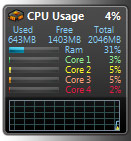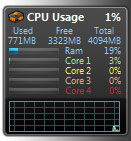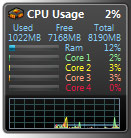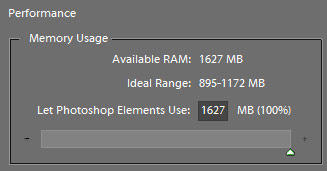
Boot Times
Does more memory affect the time it takes too boot a PC? We measured the boot time between the BIOS screen showing to when notepad automatically ran from the start menu, and took an average of three runs to see if more memory made a difference.The results are essentially a no, in fact, because Vista takes advantage of the bigger memory to preload more into it, it actually takes slightly longer to get into Windows. From top to bottom it takes only three seconds more for an extra 400MB of data to be cached into memory, so while some might scoff at Vista's "memory hogging", once you're in this could make it worth it by having programs and features load faster since at least some components are already in memory. If you notice, the percentage memory use actually goes down from 31 percent to just 12 percent.



Memory footprint in Vista x64 SP1 after boot-up for 2GB, 4GB and 8GB setups
Faster memory will cut a few seconds off this time, so we'd recommend rather than simply more or faster, try and aim for both.
Photoshop Elements 6 - Loading 20 Photos
We loaded the latest version of Photoshop Elements, and increased the memory use to 100 percent in the options. Adobe currently doesn't make a 64-bit Photoshop so it's memory footprint is limited to a maximum of 2GB, regardless of the amount of memory you install. We should expect to certainly see a benefit from a 2GB to 4GB memory system, but not necessarily 8GB. In this test we simply loaded 20 8MP JPEG photos straight from a Canon 400d Digital SLR camera (although firstly copied to the local system hard drive). We took an average time of how long it took to open all these photos ready for editing.
In respect of the 2GB limit in Photoshop, we also compared both an "average" Seagate 7200.10 250GB hard drive to a faster Western Digital RaptorX 150GB hard drive to see how a greater hard drive performance yields results in respect to just having extra memory.

Memory use after loading Photoshop Elements (regardless of available memory size) before test



2GB, 4GB and 8GB memory use after the test has completed. Click to extend images.
For just 20 photos, like you would it you were opening a few shots from an afternoons outing for example, the performance difference is negligible with just a seconds difference between 2GB and 4GB, and less than that even for 4GB to 8GB (this sub second difference is within experimental error).
The faster hard drive does make a slight difference, but again we're only talking a few seconds at most.
Photoshop Elements 6 - Loading 200 Photos
In this test we pushed the boundaries a lot more and used 200 photos instead, just like if you were loading pictures from an entire holiday at one go.As 2GB runs out of memory a lot sooner, the hard drive pagefile is used to cache the opened files and this is considerably slower. 4GB and 8GB of memory sees a dramatic 30-40 second increase in performance, although surprisingly the 8GB of memory takes 10 seconds longer on average than 4GB. This is due to the fact we previously showed the performance of four DIMMs to be slower than just two, even though there's more memory available.
When we used the Western Digital 150GB RaptorX hard drive, as an example of a using "a fast hard drive as a scratch disk" instead, the performance difference was phenomenal. Combining 4GB of memory and a very fast hard drive cuts the open time by half over a simple 2GB machine with "normal" consumer hard drive. If you're on a budget between 4GB of memory and one of the latest generation of high aieral density hard drives, like the Seagate 7200.11 or Western Digital Caviar Black, or 10,000RPM drives like the Western Digital Raptor series, then the better buy is the hard drive in this scenario. However if you spend your life in Photoshop, stretching for both yields the best benefits.

MSI MPG Velox 100R Chassis Review
October 14 2021 | 15:04











Want to comment? Please log in.